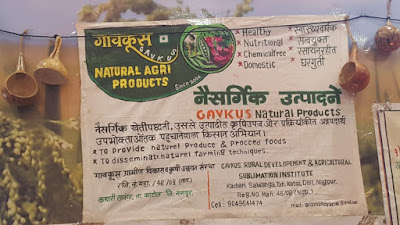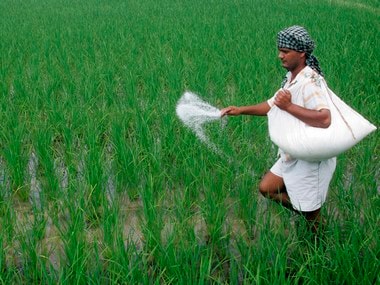*आमंत्रण-पत्रिका*
🙏🌱🐾
बीजोत्सवाच्या सहाव्या पर्वात आपल्याला अगत्याचे निमंत्रण.
या वर्षी खालील संकल्पनांवर आधारित स्टॉल्स बीजोत्सवात पाहायला मिळतील:
◆ परंपरागत बियाणे
◆ विषमुक्त व सेंद्रिय शेतमाल◆ प्रकिया केलेली उत्पादने
◆ पर्यावरण-पूरक उपयोगी साधने
◆ शहरी कचरा व्यवस्थापन
◆ गच्चीवरील शेती
◆ धुरमुक्त स्वयंपाक
◆ रानमेवा/ वनोपज
◆ खादी, इत्यादि.
कार्यक्रमाचे वेळापत्रक:-
*६ एप्रिल*
सकाळी १० – उद्घाटन
सकाळी १०.३० - डॉ. अमिताभ पावडे - जीएम कापूस व त्याचे दुष्(परिणाम)
सकाळी ११.३० - डॉ. श्रीनिवास खांदेवाले – सेंद्रिय शेतीतील अर्थकारण
दुपारी २ ते रात्री १० – प्रदर्शन व विक्री
*७ एप्रिल*
सकाळी १० – संजय पाटील - सामुदायिक बियाणे संवर्धन
सकाळी ११ – गणेश बिराजदार - सेंद्रिय शेतीपद्धती स्वीकारातले अडथळे व अडचणी
दुपारी १२ ते रात्री १० – प्रदर्शन व विक्री
*८ एप्रिल*
सकाळी १० – डॉ. उल्हास जाजू - कृषी रसायने व ग्रामीण जनतेचे आरोग्य – एक अभ्यास
सकाळी १०.४५ – डॉ. तारक काटे – सेंद्रिय शेती सर्वांचे पोट भरू शकेल काय
सकाळी ११.३० – अविल बोरकर – बियाणे व जैवविविधता कायदा आणि शेतकरी वाण
दुपारी १२ ते रात्री १० – प्रदर्शन व विक्री
*विशेष आकर्षण*:-
रोज संध्याकाळी ६ ते ९ या वेळात गीत, नाटक, वाद्य, चित्रे अश्या माध्यमांतून सादरीकरण.
रोज दुपारी २ पासून निरनिराळ्या चवींचा आनंद देणारे *खात्रीलायक सेंद्रिय माल वापरून बनवलेले विविध खाद्यपदार्थ*
*६-७-८ एप्रिल, म्युर मेमोरियल लॉन्स, सीताबर्डी, व्हेरायटी चौक, नागपूर .*
आकाश:- ९७६६९१२७४५
प्राजक्ता:- ९३७२२०४६४१
शाश्वत व शोषणमुक्त समाज निर्मितीच्या प्रयत्नांत आपले सहर्ष स्वागत आहे. 🙏🙏🙏
~~~~~~~~~~~~~~~~
You are cordially invited to 6th Beejotsav Carnival 🙏🌱🐾
This year, visit variety of stalls promoting
◆ Indigenous Seeds
◆ Organic Farm-produce
◆ Processed organic products
◆ Urban waste management
◆ Sustainable lifestyle products
◆ Animal/ Forest produces
◆ Khadi etc.
Program Schedule:-
*6th April*
10 AM – Inauguration and Presentation of Survey by various farmer's organizations from Wardha – Vasant Futane
10.30 AM – Amitabh Pawade – ill Effets of GM Cotton
11.30 AM – Dr. Shriniwas Khandewale – Economy behind organic farming
2 PM to 10 PM – Exhibition and Sale
*7th April*
10 AM – Sanjay Patil – Conservation of Indigenous seeds
11AM – Ganesh Birajdar – Challenges in adopting organic farming
12 Noon to 10 PM – Exhibition and Sale
*8th April*
10 AM – Dr. Ulhas Jajoo- Chemical Pesticides and related Health Issues
10.45AM- Dr. Tarak Kate - Can Organic Farming suffice country’s food needs ?
12.15 – Avil Borkar – Seed and Biodiversity Regulations
12 Noon to 10 PM – Exhibition and Sale
*Special Attractions:-*
◆ Treat yourself with original experiments in music, theatre, instrumental, caricatchers by artists from every nook and corner.
◆ Treat yourself with delicious organic food, to complete the experience
*6-7-8 April*
Mure Memorial Lawns, Variety Square, Opposite Eternity Mall, Sitaburdi, Nagpur.
*Akash :- 9766912745*
*Prajakta:-9372204641*
You are all welcome to be the part of the effort for sustainable and exploitation-free society. 🙏🙏🙏
🙏🌱🐾
बीजोत्सवाच्या सहाव्या पर्वात आपल्याला अगत्याचे निमंत्रण.
या वर्षी खालील संकल्पनांवर आधारित स्टॉल्स बीजोत्सवात पाहायला मिळतील:
◆ परंपरागत बियाणे
◆ विषमुक्त व सेंद्रिय शेतमाल◆ प्रकिया केलेली उत्पादने
◆ पर्यावरण-पूरक उपयोगी साधने
◆ शहरी कचरा व्यवस्थापन
◆ गच्चीवरील शेती
◆ धुरमुक्त स्वयंपाक
◆ रानमेवा/ वनोपज
◆ खादी, इत्यादि.
कार्यक्रमाचे वेळापत्रक:-
*६ एप्रिल*
सकाळी १० – उद्घाटन
सकाळी १०.३० - डॉ. अमिताभ पावडे - जीएम कापूस व त्याचे दुष्(परिणाम)
सकाळी ११.३० - डॉ. श्रीनिवास खांदेवाले – सेंद्रिय शेतीतील अर्थकारण
दुपारी २ ते रात्री १० – प्रदर्शन व विक्री
*७ एप्रिल*
सकाळी १० – संजय पाटील - सामुदायिक बियाणे संवर्धन
सकाळी ११ – गणेश बिराजदार - सेंद्रिय शेतीपद्धती स्वीकारातले अडथळे व अडचणी
दुपारी १२ ते रात्री १० – प्रदर्शन व विक्री
*८ एप्रिल*
सकाळी १० – डॉ. उल्हास जाजू - कृषी रसायने व ग्रामीण जनतेचे आरोग्य – एक अभ्यास
सकाळी १०.४५ – डॉ. तारक काटे – सेंद्रिय शेती सर्वांचे पोट भरू शकेल काय
सकाळी ११.३० – अविल बोरकर – बियाणे व जैवविविधता कायदा आणि शेतकरी वाण
दुपारी १२ ते रात्री १० – प्रदर्शन व विक्री
*विशेष आकर्षण*:-
रोज संध्याकाळी ६ ते ९ या वेळात गीत, नाटक, वाद्य, चित्रे अश्या माध्यमांतून सादरीकरण.
रोज दुपारी २ पासून निरनिराळ्या चवींचा आनंद देणारे *खात्रीलायक सेंद्रिय माल वापरून बनवलेले विविध खाद्यपदार्थ*
*६-७-८ एप्रिल, म्युर मेमोरियल लॉन्स, सीताबर्डी, व्हेरायटी चौक, नागपूर .*
आकाश:- ९७६६९१२७४५
प्राजक्ता:- ९३७२२०४६४१
शाश्वत व शोषणमुक्त समाज निर्मितीच्या प्रयत्नांत आपले सहर्ष स्वागत आहे. 🙏🙏🙏
~~~~~~~~~~~~~~~~
You are cordially invited to 6th Beejotsav Carnival 🙏🌱🐾
This year, visit variety of stalls promoting
◆ Indigenous Seeds
◆ Organic Farm-produce
◆ Processed organic products
◆ Urban waste management
◆ Sustainable lifestyle products
◆ Animal/ Forest produces
◆ Khadi etc.
Program Schedule:-
*6th April*
10 AM – Inauguration and Presentation of Survey by various farmer's organizations from Wardha – Vasant Futane
10.30 AM – Amitabh Pawade – ill Effets of GM Cotton
11.30 AM – Dr. Shriniwas Khandewale – Economy behind organic farming
2 PM to 10 PM – Exhibition and Sale
*7th April*
10 AM – Sanjay Patil – Conservation of Indigenous seeds
11AM – Ganesh Birajdar – Challenges in adopting organic farming
12 Noon to 10 PM – Exhibition and Sale
*8th April*
10 AM – Dr. Ulhas Jajoo- Chemical Pesticides and related Health Issues
10.45AM- Dr. Tarak Kate - Can Organic Farming suffice country’s food needs ?
12.15 – Avil Borkar – Seed and Biodiversity Regulations
12 Noon to 10 PM – Exhibition and Sale
*Special Attractions:-*
◆ Treat yourself with original experiments in music, theatre, instrumental, caricatchers by artists from every nook and corner.
◆ Treat yourself with delicious organic food, to complete the experience
*6-7-8 April*
Mure Memorial Lawns, Variety Square, Opposite Eternity Mall, Sitaburdi, Nagpur.
*Akash :- 9766912745*
*Prajakta:-9372204641*
You are all welcome to be the part of the effort for sustainable and exploitation-free society. 🙏🙏🙏











